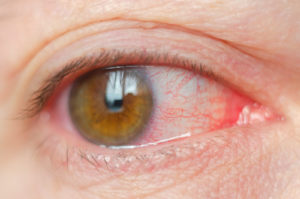You may hear about how important sleep is for your brain, muscles, immune system, and reducing long-term stress.
You may not have heard what this important function does for your eyes! Join us as we take a look at all the benefits of a good night sleep on your eyes and vision.
Glaucoma

According to the Glaucoma Research Foundation, “too little … sleep has been linked to worsening visual field defects in glaucoma patients and a higher rate of glaucoma.”
Sleep apnea, a condition in which a person periodically stops breathing during sleep, can cause damage to the optic nerve in the eye by lack of oxygen.
Eyelid Twitching
A lack of sleep is the leading cause of myokymia, so called eye spasms. While they’re not permanently harmful and don’t impact your clarity of vision, they can be very disruptive! Thankfully, they go away again once you’re fully rested.

Dry Eye
In the Journal of Investigative Ophthalmology and Vision Science , they checked the tear-film quality in people who were sleep deprived and found that a lack of sleep made dry eye worse.
Sleep Tips

There are many resources around for improving your sleep, so we’ll focus on a few that are related to your eyes.
Morning Light Exposure
The Sleep Foundation shares that sunlight exposure first thing in the morning is key to producing enough melatonin, the “sleep hormone,” when it’s time to go to sleep again.
If you find yourself struggling to fall asleep at a time that will give you enough sleep, early morning sun exposure can help. Sunlight contains the full spectrum of wavelengths and produces optimal melatonin levels compared to indoor lighting. Additionally, even a cloudy day has 4 times more light as a well-lit room (and a sunny day has 200x more).
Evening Darkness
Since the advent of artificial lights, people have been sleeping less and less. The hormone melatonin regulates sleepiness and its production is suppressed when your eyes are exposed to lights. Candle light and fire light is about 10 times less bright than a regularly lit room, and so these light sources tend to suppress melatonin less.
Blue light from electronic screens is notorious for suppressing melatonin. In an ideal world, you would avoid using these screens for at least one hour prior to sleep. That’s not always convenient, so some people have taken to wearing blue-light blocking glasses at night time.